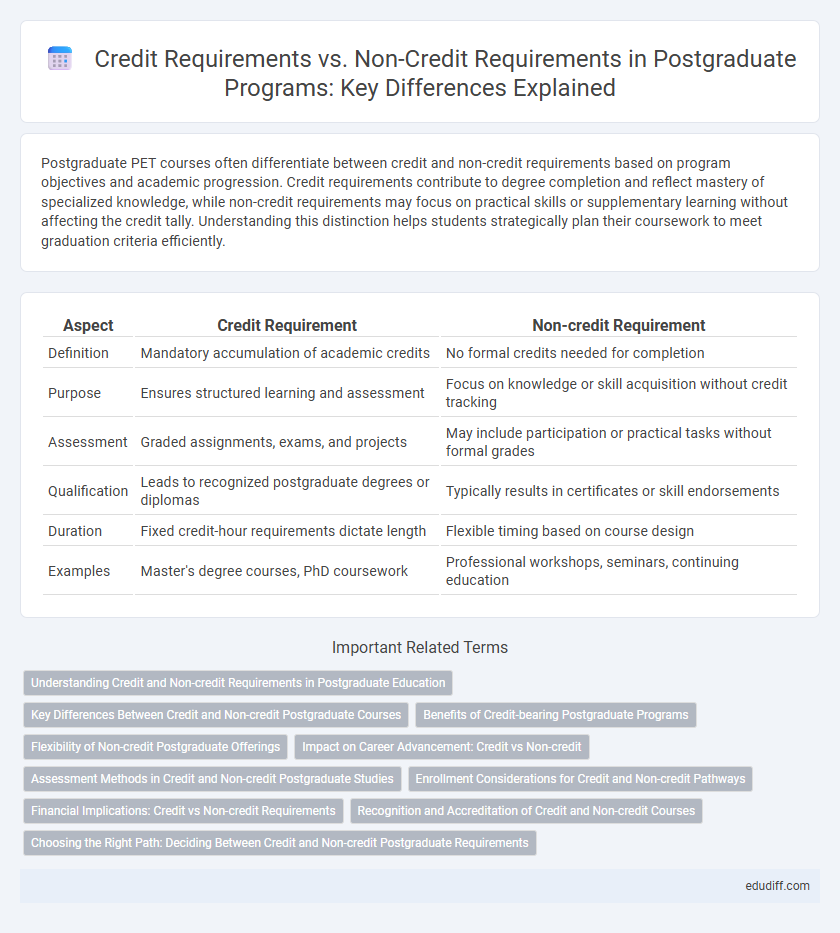Postgraduate PET courses often differentiate between credit and non-credit requirements based on program objectives and academic progression. Credit requirements contribute to degree completion and reflect mastery of specialized knowledge, while non-credit requirements may focus on practical skills or supplementary learning without affecting the credit tally. Understanding this distinction helps students strategically plan their coursework to meet graduation criteria efficiently.
Table of Comparison
| Aspect | Credit Requirement | Non-credit Requirement |
|---|---|---|
| Definition | Mandatory accumulation of academic credits | No formal credits needed for completion |
| Purpose | Ensures structured learning and assessment | Focus on knowledge or skill acquisition without credit tracking |
| Assessment | Graded assignments, exams, and projects | May include participation or practical tasks without formal grades |
| Qualification | Leads to recognized postgraduate degrees or diplomas | Typically results in certificates or skill endorsements |
| Duration | Fixed credit-hour requirements dictate length | Flexible timing based on course design |
| Examples | Master's degree courses, PhD coursework | Professional workshops, seminars, continuing education |
Understanding Credit and Non-credit Requirements in Postgraduate Education
Postgraduate education involves distinct credit and non-credit requirements that shape the academic journey. Credit requirements typically include coursework and research components quantified by credit hours necessary for degree completion, whereas non-credit requirements encompass activities like seminars, workshops, or comprehensive exams that support skill development without contributing to credit totals. Understanding these components ensures effective planning and fulfillment of the program's academic and professional standards.
Key Differences Between Credit and Non-credit Postgraduate Courses
Credit postgraduate courses contribute to degree completion by accumulating required credit hours, while non-credit courses offer professional development or specialized knowledge without affecting academic credit totals. Credit courses typically follow a structured curriculum with assessments that impact grade point average and progression, whereas non-credit courses emphasize skills enhancement, flexible scheduling, and may cater to lifelong learning or continuing education needs. Institutions often require credit courses for formal qualifications, whereas non-credit courses serve as supplementary educational opportunities.
Benefits of Credit-bearing Postgraduate Programs
Credit-bearing postgraduate programs offer measurable academic progress by assigning quantifiable credits that contribute toward degree completion. These credits facilitate transferable qualifications across institutions and enhance professional recognition in various fields. Students benefit from structured learning paths, increased employability, and eligibility for further advanced studies due to clearly documented academic achievements.
Flexibility of Non-credit Postgraduate Offerings
Non-credit postgraduate offerings provide significant flexibility for professionals seeking skill enhancement without the pressure of formal credit accumulation or grade requirements. These programs allow learners to customize their education timeline and focus areas, accommodating work schedules and personal commitments more effectively than traditional credit-based courses. This adaptability supports lifelong learning and continuous professional development in a rapidly evolving job market.
Impact on Career Advancement: Credit vs Non-credit
Postgraduate credit requirements provide a structured curriculum that directly enhances specialized knowledge and skills, making candidates more competitive for career advancement and professional certifications. Non-credit requirements, while valuable for practical experience and networking, often lack formal recognition by employers, potentially limiting their impact on promotions and salary increases. Employers typically prioritize credit-bearing postgraduate qualifications when assessing candidates for advanced roles and leadership positions.
Assessment Methods in Credit and Non-credit Postgraduate Studies
Assessment methods in credit-based postgraduate studies typically include examinations, essays, presentations, and coursework assignments designed to evaluate mastery of specific learning outcomes. Non-credit postgraduate programs often utilize formative assessments such as reflective journals, peer feedback, and practical demonstrations to enhance learning without contributing to formal credit accumulation. The divergence in assessment approaches directly aligns with the purpose of credit acquisition in degree progression versus skill development or professional training in non-credit contexts.
Enrollment Considerations for Credit and Non-credit Pathways
Enrollment considerations for postgraduate programs vary significantly between credit and non-credit pathways, affecting academic planning and credential outcomes. Credit-based enrollment requires students to meet specific credit hour thresholds that contribute toward degree completion, influencing tuition costs and progression timelines. Non-credit pathways offer flexible scheduling and skill acquisition opportunities without academic credit, ideal for professional development or personal enrichment without degree obligations.
Financial Implications: Credit vs Non-credit Requirements
Postgraduate programs with credit requirements often involve tuition fees per credit hour, directly impacting students' overall financial burden compared to non-credit courses, which typically have flat fees or lower costs. Financial aid and scholarships are more commonly applicable to credit-bearing courses, providing potential cost relief for enrolled students. Non-credit programs may offer flexible, lower-cost options but usually do not qualify for federal financial aid, affecting long-term investment value in postgraduate education.
Recognition and Accreditation of Credit and Non-credit Courses
Postgraduate programs distinguish between credit and non-credit courses based on recognition and accreditation criteria, with credit courses typically accredited by recognized higher education authorities and contributing directly to degree requirements. Non-credit courses often serve as professional development or skill enhancement without formal recognition towards a degree, lacking the comprehensive accreditation that credit courses receive. Accreditation bodies and academic institutions prioritize credit courses for their rigor and alignment with degree standards, ensuring transferability and recognition across universities and professional sectors.
Choosing the Right Path: Deciding Between Credit and Non-credit Postgraduate Requirements
Selecting the right postgraduate path depends on understanding the distinctions between credit and non-credit requirements, where credit courses contribute to a degree or certification with measurable academic credits, while non-credit courses focus on skill enhancement without affecting GPA or degree progress. Credit requirements often demand more rigorous assessment, structured curricula, and adherence to academic standards essential for graduation, whereas non-credit options provide flexibility and professional development without formal grading. Evaluating career goals, time commitment, and intended qualification outcomes helps determine whether credit-based postgraduate studies or non-credit professional courses best align with individual aspirations.
Credit Requirement vs Non-credit Requirement Infographic

 edudiff.com
edudiff.com